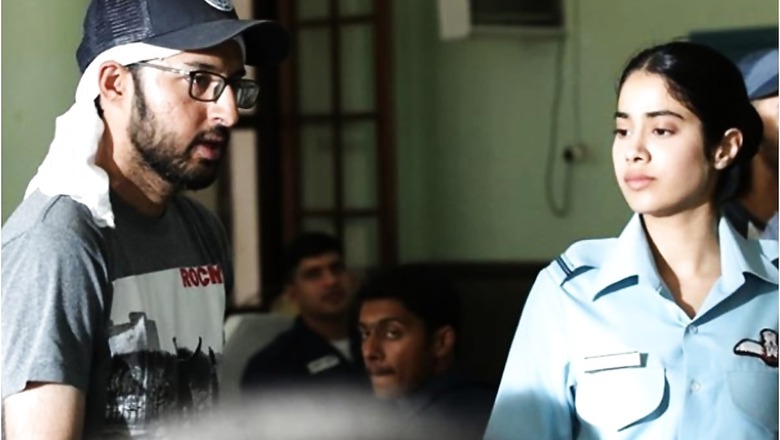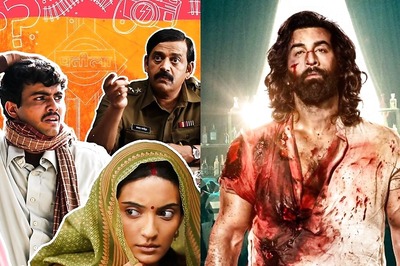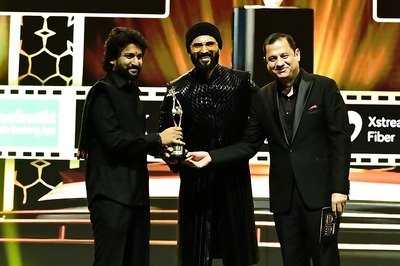
views
Cinema leaves a lasting impact on people. While the film’s mythical status was stripped off with the advent of technology, creating moving images, and in turn, inspiring emotions became democratic and more inclusive, so much so that nowadays mobile cameras have made it possible for creative storytelling ambitions to crop up in every nook and corner.
However, a filmmaker’s politics and his/her intentions cannot be left unscrutinised, especially amid the barrage of content that is available for digital consumption. The most recent case in point that has ticked off several concerned parties with its depiction of the life and struggles of India’s first woman pilot in combat is Gunjan Saxena: The Kargil Girl, currently streaming on Netflix.
The makers have been targeted for distorting basic facts, overplaying drama for effect, creating scenes that are ‘far from reality’ and propagating the image of its female lead, Janhvi Kapoor. These allegations have come from various credible Indian Air Force (IAF) ex-officers, who have not taken kindly to ‘twisted reality’ in the Gunjan Saxena biopic.
With such a backdrop, it becomes important to examine what may and may not pass off for a biopic and how viewers interact with various subject matters and its treatment.
Perception over facts
In a way, the movie business thrives on perception of the viewers about the subject and reality is often compromised. Little wonder that the highest grossing film globally is Avengers: Endgame, an action epic based on make-believe characters and their unreal superhuman powers and invading aliens.
In stark contrast is the genre of biography, which often inspires people for the very fact that no matter how mesmerising, unreal or difficult a said person’s life has been portrayed, there is the overriding belief that difficulties can be conquered. It is probably also the only form of storytelling that depicts ‘heroism’ as it is.
So, when showing a woman battling alleged ‘sexist’ opinions of fellow male officers and her instructor, it would have served tremendously well if Gunjan Saxena biopic were substantiated with facts. Howsoever dramatic an arm wrestling scene between opposite sexes may seem for a biopic showing women empowerment and bravery, it would have been better if there was an iota of truth to it. Otherwise, gendered stereotypes keep perpetuating and that too by making soft targets out of people who are assumedly beyond such prejudices.
Undeserved adulation
Disclaimer added, a dramatic take on real life events is welcomed in biopics. However, while making the leading figures ‘heroes’ for the purposes of storytelling, other vital characters must not be sidelined or fictionalised beyond recognition. This creates an environment of unfair propagation and distrust that may be hurtful to those involved with the particular incident.
This happened when Neerja (2016) released. Although Sonam Kapoor received all the adulation, those involved in the actual hijacking of Pan Am Flight 73 felt at the time that film is more fiction than reality. Nupoor Abrol, one of the crew members of the flight, objected to Neerja Bhanot biopic saying it robbed some vital people on board that day with credit. Obviously, it was a result of a peculiar directorial vision, fictionlised line of events and their eventual filming for the big screen.
Priorities
Recently released ‘inspirational’ biopics–Mission Mangal and Parmanu: The Story of Pokhran–have been loved by the audiences. They presented a glossy and glorified version of real events around their respective subject matters and timelines. Even though some scenes may have come across as ‘funny’ and ‘unreal’, the viewers let it slip by because they tend to forward a positive image of the country and its apex institutions.
In Gunjan Saxena, a prestigious organisation like the IAF has been targetted and made out to be discriminatory. Because of several objectionable scenes, and there are quite a few, what is projected of the armed forces is that they are sexist. This is a serious charge which should have been cross-verified and not milked for cinematic pleasure. The context can’t be twisted to malign a premiere agency’s image.
Imperfect people and their imperfect lives
Biopics today are all about romanticising their characters. From overcoming one difficulty to another, screen idols seem to be doing everything right from the word go. While dramatic tension and catharsis is achieved in the process by means such as manipulation and “triumph-of-the-human-spirit” tropes, flaws are conveniently overlooked for heroic personae.
Imperfection then becomes unoriginal and uninspiring, unlike what real life is all about.

















Comments
0 comment